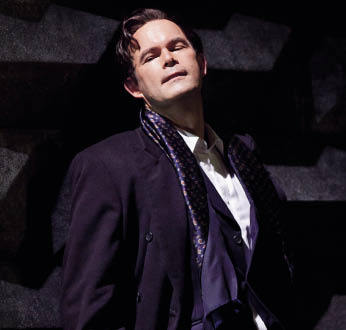Don Giovanni
Glyndebourne, until 27 August
Rigoletto
Welsh National Opera, on tour
Glyndebourne’s new production, by Jonathan Kent, of Don Giovanni is a wretched failure, not gross like its last one, in which the characters waded around in shit and Don Giovanni disembowelled a dead horse to eat its innards, but as irrelevant to the essence of what now seems to be Mozart’s most elusive dramatic work. In 15 years of reviewing I haven’t seen a production which was even approximately adequate, presumably because, while Mozart could perform a miraculous balancing act with his central figure, we no longer can. Gerald Finley, the extremely experienced performer of the title role, here makes him a man without qualities. He is smooth, but that’s about it: he sidles effectively into ‘La ci darem’ but otherwise gives little demonstration of even an appetite for sex: he is more at home threatening Leporello, who emerges as the more interesting character, though why, when the curtain rises, it should be him in his boxer shorts while Giovanni desperately struggles to maintain his foothold beside Anna’s window I didn’t understand.
The evening opened with a shock: with the lights still up, and the audience gossiping in that urgent way that people condemned to be silent for the next hour and a half always do, the shattering opening chord rang out, the lights dimmed, the curtain rose, and a house-sized cube began to revolve, while the Overture became less pressing and interesting. The sides of the cube are various, and it opens to reveal assorted scenes: quite ingenious, but it draws more attention to itself than scenery should. And at the end of Act I the thunderbolt which the other characters tell the Don will eventually strike him makes its impressive entry, reducing his palace to a ruin and setting large areas on fire, while Giovanni braves the flames and the curtain comes down — yet another unsatisfactory way of coping with the problem of his escape when surrounded by his enemies. Also not a good idea as a way of coping with the fundamental structural flaw of Don Giovanni, that really there’s nothing much for Act II to deal with except the Don’s punishment.
Vladimir Jurowski, who conducts, talked about this very intelligently on Radio 3, but claimed that doing the Vienna version solved the difficulty. That involves eliminating Don Ottavio’s ‘Il mio tesoro’, no big sacrifice; and also Elvira’s ‘Mi tradi’, though Kate Royal, making her role debut, wanted to sing it so was allowed to; but she was in such poor voice, especially in Act I, that she must have wished she hadn’t. It also involves a tiresome duet for Leporello and Zerlina, in which she threatens to castrate him — this is irrelevant to anything, and is alarmingly perfunctory music; and a cut in the epilogue, the passage where the remaining characters tell us what they intend to do with the rest of their lives. It’s hard to see how anyone who appreciates the Act II problem could have thought that these were the right measures to cope with it.
The star of the show is certainly the Leporello of Luca Pisaroni, sexy, insubordinate, with a good line in satire, and an attractive, quite large voice. The rest of the cast is unmemorably adequate. If the conducting had been more alert they might have made a strong impression, but Act I threatened to turn into a demonstration of the Second Law of Thermodynamics. And such stirring moments as the entry of Ottavio and Anna in the Act II sextet went for nothing. At last, in the supper scene — the slope of Giovanni’s table nearly gave me vertigo — Jurowski tightened things up, and the confrontation with the Commendatore, here revealed by Giovanni when he overturned the table and found his undead foe under it, was thrilling. Anyone who can’t get a ticket for this need not worry.
In Birmingham I saw Welsh National Opera’s revival of Rigoletto, the production by James MacDonald, which takes place in Clinton’s Washington, Act II in the Oval Office itself. I hadn’t seen it before and, granted the unlikelihood of a President having a court jester, except an involuntary one, it works reasonably — granted also the preposterousness of the plot, wherever and whenever it is set.
The main point of interest this time was Simon Keenlyside’s debut as Rigoletto: gorgeously, powerfully, harrowingly sung, but a piece of miscasting: he looks like Gilda’s brother, is hopelessly handsome, magnetically appealing, but unable to show Rigoletto in the round. The Duke of Gwyn Hughes Jones is excitingly sung, but otherwise Gilda’s enthralment to him is mysterious. Sarah Coburn is beautiful, vulnerable, a virtually perfect Gilda. All round it’s a strong and interesting account, and should be seen even though there is a fascinating mistake at its centre.






Comments